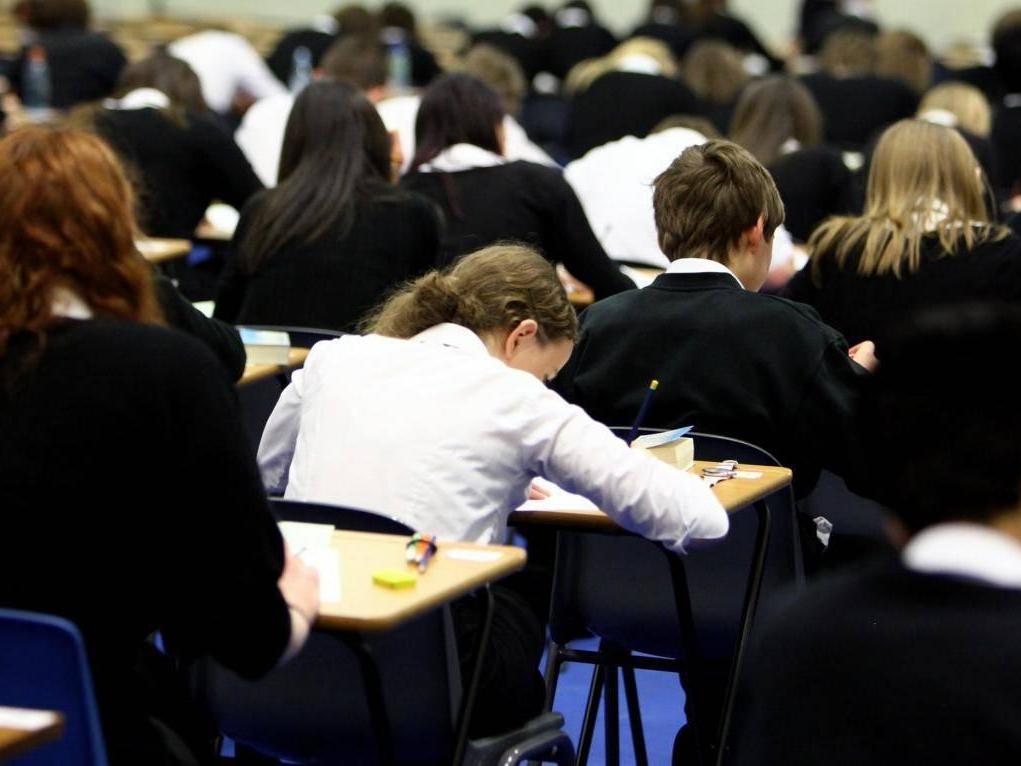Proportion of poorer children falls in grammar schools receiving £50m expansion funding, data suggests
Exclusive: ‘Even at their most ambitious, grammar schools admit very few disadvantaged pupils’

Your support helps us to tell the story
From reproductive rights to climate change to Big Tech, The Independent is on the ground when the story is developing. Whether it's investigating the financials of Elon Musk's pro-Trump PAC or producing our latest documentary, 'The A Word', which shines a light on the American women fighting for reproductive rights, we know how important it is to parse out the facts from the messaging.
At such a critical moment in US history, we need reporters on the ground. Your donation allows us to keep sending journalists to speak to both sides of the story.
The Independent is trusted by Americans across the entire political spectrum. And unlike many other quality news outlets, we choose not to lock Americans out of our reporting and analysis with paywalls. We believe quality journalism should be available to everyone, paid for by those who can afford it.
Your support makes all the difference.The proportion of poorer children admitted to a group of grammar schools that will share £50m of government funding has fallen despite pressure from ministers to diversify their intakes, figures suggest.
Just over 7 per cent of places at grammar schools that will receive expansion funding were offered to disadvantaged pupils for September, freedom of information data shared with The Independent shows.
Campaigners and headteachers have criticised the government’s decision to allocate expansion funding to existing grammar schools and argue that policies to widen access to poorer children are not working.
Of the grammar schools that provided full data – 13 of the 16 schools given funding – only 7.5 per cent of places this year were allocated to pupil premium children, those who have received free school meals.
This was a slight fall on last year when the expanding schools offered 7.6 per cent of places to pupils from disadvantaged backgrounds, according to the analysis by campaign group Comprehensive Future.
In England, currently 28 per cent of secondary school pupils are eligible for pupil premium. Campaigners say the low percentage in these grammar schools, in comparison to the national figure, is a “scandal”.
The figures come after the government called on existing grammar schools to alter their admissions policies in a bid to admit more students from disadvantaged backgrounds.
Last year, the Department for Education (DfE) announced a £50m expansion fund for selective schools which committed to improving access for poorer children following concerns about social mobility.
In December, the identities of the first 16 grammar schools which will share the Selective School Expansion Fund to create thousands of additional places for pupils were unveiled by the government.
These schools were chosen on the condition that they would boost their numbers of poorer children.
But the freedom of information data shows that just 145 of 1,929 places for September 2019 were awarded to pupil premium children – despite the fact that all the schools offered priority to poorer pupils in their admission policies.
The pupils admitted this year are through admission policies set before the schools were given funding – but an analysis has found that only some schools are doing more to boost diversity for next year.
The campaign group found that nine of the 16 schools are making further plans to boost the number of disadvantaged children in their admissions policies for 2020 – but seven are making no more changes.
Nuala Burgess, chair of campaign group Comprehensive Future, has said the government’s policy to improve social mobility is “not working”, adding its grammar school ideology is “fundamentally flawed”.
She said: “Even at their most ambitious, grammar schools admit very few disadvantaged pupils. The £200m allocated for grammar school expansion is a scandalous waste of money.”
Ms Burgess says the next prime minister should abandon the policy of awarding additional funding to a handful of grammar schools as she argues they are “doing little to earn their windfall”.
Geoff Barton, general secretary of the Association of School and College Leaders, said the figures show that the expansion of grammar schools will not improve social mobility for the vast majority of pupils.
He added: “Severe teacher shortages and real-terms cuts in funding in the state sector are the issues which the government should be addressing in order to give every child the best possible chance in life, rather than becoming distracted by a policy on increasing selection which is not the right way to move forward in the 21st century.”
Mary Bousted, joint general secretary of the National Education Union, said: “The justification for this preferential funding for selective schools was that they would take in more children from poorer backgrounds but this is clearly not happening.”
She added it was a “travesty” that the government had allocated funding to grammar school expansion when the state school sector is “reeling from massive cuts”.
The next round of bids have been submitted for the £50m a year expansion fund with grammar schools due to be named in the autumn.
A DfE spokesperson said: “Tackling disadvantage is a priority for the government. The Selective School Expansion fund is one way we are improving access for disadvantaged pupils.
“Those schools successful in their bids for the Selective School Expansion funding clearly set out their plans to prioritise access for pupil premium children and outreach work with local schools.
“Over half of the schools have committed to lowering the mark required to pass the entrance test for pupil premium pupils.
“Schools will be required to report back to the department on the delivery of their proposals to improve access for disadvantaged pupils.”
Join our commenting forum
Join thought-provoking conversations, follow other Independent readers and see their replies
Comments